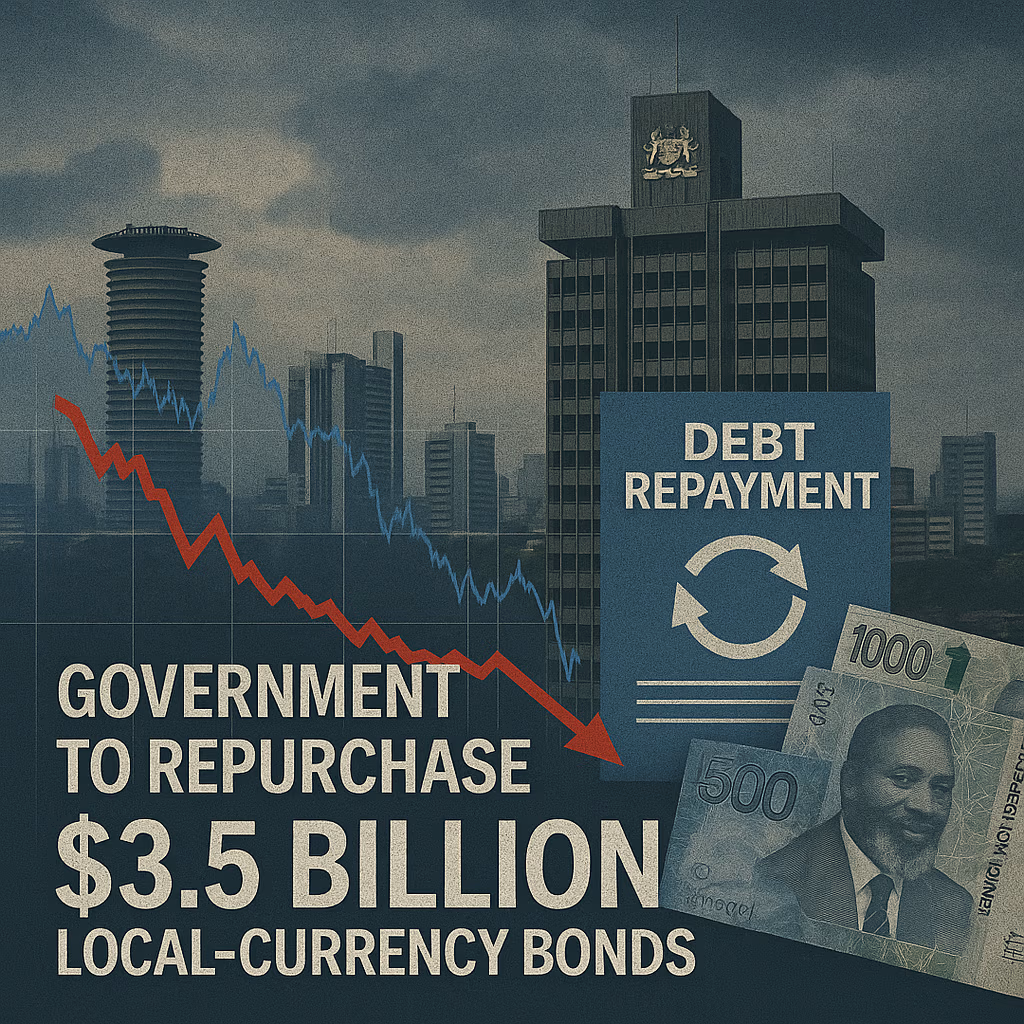Kenya is weighing the possibility of repurchasing up to $3.5 billion in local-currency bonds, a move that could reshape the country’s debt profile and provide much-needed breathing room for its strained public finances. The plan, currently under discussion by policymakers and financial advisers, reflects the government’s growing concern over the cost of servicing domestic debt at a time when fiscal space is tight and external obligations loom large.
A Bold Step in Debt Management
The repurchase plan would involve buying back a portion of outstanding domestic bonds denominated in Kenyan shillings. These securities make up a significant share of Kenya’s overall debt portfolio, and their high yields have pushed debt servicing costs to unsustainable levels. By repurchasing bonds—potentially at discounted market prices—the government hopes to reduce interest expenses, extend maturities, and rebuild investor confidence.
Such a move would represent a proactive step in addressing the structural challenges that have weighed on Kenya’s public finances. While the country has already undertaken several fiscal reforms, including new tax measures and spending rationalization, its debt profile continues to present risks to both domestic stability and external investor sentiment.
Why Local-Currency Debt Matters
Kenya’s debt mix is heavily skewed toward domestic borrowing. While this reduces exposure to foreign exchange volatility, it also creates high interest burdens, as local-currency bonds often carry double-digit yields. Over the past year, yields on Treasury bills and bonds have risen sharply, reflecting tighter liquidity conditions and investor concerns about fiscal risks.
This has made rolling over domestic debt increasingly expensive, crowding out resources for infrastructure and social spending. By targeting a repurchase program, Kenya aims to break the cycle of rising costs and limited fiscal space, while signaling to markets that it is serious about debt sustainability.
Investor Confidence and Market Reactions
The success of any repurchase plan will depend heavily on investor response. Bondholders may be willing to sell back securities if offered attractive terms, but they will also assess the government’s fiscal credibility and long-term strategy. If executed effectively, the program could restore investor confidence, leading to lower yields in future auctions and stabilizing the domestic debt market.
Already, market participants are closely monitoring the government’s signals. A credible buyback plan could ease concerns among foreign investors who have been cautious about Kenya’s fiscal position. At the same time, it would reassure local institutional investors, such as pension funds and banks, that the government is committed to managing risks responsibly.
Lessons from Previous Debt Operations
Debt repurchase and restructuring programs are not new to emerging markets. Countries from Latin America to Sub-Saharan Africa have implemented similar measures to reduce debt burdens and improve fiscal flexibility. For Kenya, the challenge lies in striking a balance—repurchasing enough bonds to have a meaningful impact while ensuring that the program itself does not strain government finances.
In some cases, governments have used external financing or concessional loans to fund repurchases. Kenya may explore similar avenues, especially if international partners or multilateral institutions are willing to provide support. The government must also design the program carefully to avoid disrupting liquidity in the domestic bond market.
Broader Debt Challenges
Kenya’s debt problem extends beyond local-currency bonds. External obligations, including Eurobond maturities due in the coming years, represent another source of risk. The government recently managed to refinance part of its Eurobond obligations, but with global interest rates elevated, external borrowing remains expensive.
The combination of heavy domestic interest costs and looming external repayments underscores the urgency of comprehensive debt management. The potential repurchase plan is therefore only one piece of a broader puzzle, which includes fiscal reforms, improved revenue collection, and disciplined spending.
Implications for the Economy
If successful, the bond repurchase program could deliver several benefits to Kenya’s economy. Lower domestic borrowing costs would free up resources for critical infrastructure projects, social programs, and private-sector support. Reduced fiscal stress could also boost business confidence, encourage investment, and stabilize the shilling.
On the other hand, a poorly executed program could backfire, raising doubts about fiscal strategy and triggering further volatility in bond markets. Transparency, communication, and careful design will be critical in ensuring that the initiative strengthens rather than weakens Kenya’s financial position.
Regional and Global Context
Kenya’s deliberations come at a time when many emerging markets are grappling with rising debt burdens. Higher global interest rates, weaker growth, and tighter capital flows have left governments with fewer options for financing. In Sub-Saharan Africa, several countries have already sought debt restructuring or IMF support to manage fiscal pressures.
By considering a proactive domestic repurchase plan, Kenya is signaling that it intends to chart a more independent path, avoiding a full-blown debt crisis. If successful, it could provide a model for other African economies struggling with similar dynamics.
Looking Ahead
The coming weeks will be crucial as policymakers finalize details of the potential bond repurchase. Markets will look for clarity on the scale, funding sources, and execution timeline of the plan. They will also seek reassurances that the program is part of a broader fiscal strategy aimed at long-term sustainability.
For Kenya, this is not just a financial maneuver but a test of credibility. The ability to execute a complex debt operation successfully would enhance the government’s reputation with both local and international investors. It would also provide valuable breathing room at a time when fiscal pressures threaten to derail development goals.
Conclusion: A Pivotal Moment for Kenya’s Finances
Kenya’s consideration of a $3.5 billion local-currency bond repurchase highlights the difficult choices facing emerging markets under debt stress. If executed carefully, the program could reduce borrowing costs, restore investor confidence, and strengthen the country’s fiscal position. But it also carries risks, requiring precise design and consistent communication.
As the government weighs its options, the stakes are high. Success would mark a turning point in Kenya’s debt story, while failure could deepen fiscal vulnerabilities. Either way, the decision underscores the importance of proactive debt management in securing economic stability for the future.





